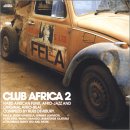[^^ Up] - [jahsonic.com] - [Next >>]

But the year 2000's dopest flashback was definitely Afrobeat, the Nigerian-born funk thang coined by the late Fela Kuti. MCA rereleased 20 LPs of Fela's early classics to coincide with his son Femi's coming-out party, "Beng Beng Beng." And that triggered a rush of indie African groove compilations.
These sets didn't just collect oldies but also promoted Fela's 21st-century heirs, from his ex-drummer Tony Allen to new crews like Antibalas to remix experiments by Masters at Work. Afrobeat was heard everywhere, it seemed, from club DJ sets to coffee shops. So why now? Maybe it's that as acts from Moby to Groove Armada to the Roots learned to integrate the vibe of modern DJ music with live instrumentation, Fela's solar-powered polyrhythms proved to be a self-contained Ph.D. program. -- Wil Hermes in Spin Magazine

'Versioning', the custom of releasing different versions of the same rythm or melody, is at the heart of all Afro-American and Carribean musics: jazz, blues, rap, r&b, reggae, house, and so on. With the advent of the twelve inch vinyl disc, the same principle has been extended to black American soul.
A rhythm, riddim in reggae vocabulary, is a rhythm pattern. It's basically a bassline and usually a special drumpattern is used with the bassline. Sometimes a short melody is associated with the riddim, but the main ingredient is the bassline. In other musical contexts it would be called a groove, and that pretty well sums up what it is about.